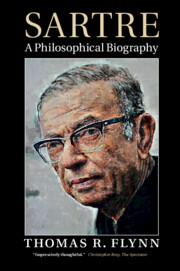Book contents
- Frontmatter
- Dedication
- Contents
- Preface
- Acknowledgments
- Abbreviations
- 1 The childhood of a genius
- 2 An elite education: student, author, soldier, teacher
- 3 Teaching in the lycée, 1931–1939
- 4 First triumph: The Imagination
- 5 Consciousness as imagination
- 6 The necessity of contingency: Nausea
- 7 The war years, 1939–1944
- 8 Bad faith in human life: Being and Nothingness
- 9 Existentialism: the fruit of liberation
- 10 Ends and means: existential ethics
- 11 Means and ends: political existentialism
- 12 A theory of history: Search for a Method
- 13 Individuals and groups: Critique of Dialectical Reason
- 14 A second ethics?
- 15 Existential biography: Flaubert and others
- Conclusion: the Sartrean imaginary, chastened but indomitable
- Select bibliography
- Index
- References
1 - The childhood of a genius
Published online by Cambridge University Press: 18 December 2014
- Frontmatter
- Dedication
- Contents
- Preface
- Acknowledgments
- Abbreviations
- 1 The childhood of a genius
- 2 An elite education: student, author, soldier, teacher
- 3 Teaching in the lycée, 1931–1939
- 4 First triumph: The Imagination
- 5 Consciousness as imagination
- 6 The necessity of contingency: Nausea
- 7 The war years, 1939–1944
- 8 Bad faith in human life: Being and Nothingness
- 9 Existentialism: the fruit of liberation
- 10 Ends and means: existential ethics
- 11 Means and ends: political existentialism
- 12 A theory of history: Search for a Method
- 13 Individuals and groups: Critique of Dialectical Reason
- 14 A second ethics?
- 15 Existential biography: Flaubert and others
- Conclusion: the Sartrean imaginary, chastened but indomitable
- Select bibliography
- Index
- References
Summary
Sartre was born in Paris on June 21, 1905, to Jean-Baptiste and Anne-Marie Sartre. His mother was née Schweitzer, from a prominent, liberal Alsatian family, and through her he was related to Nobel Peace laureate Albert Schweitzer, whom he once described as “my cousin Albert [who] was not bad at the organ.” His father, an ensign in the French navy, was on duty overseas at the time of Sartre’s birth. On a previous posting he had contracted a fever, and a year after Sartre’s birth he died of it, at the age of 30. Rather unsympathetically, Sartre observed that his father had had the good manners to die early in his life, thus leaving him without a superego. Sartre was raised by his mother in her parents’ home, for the first five years in the Parisian suburb of Meudon, and from 1911 in their Paris apartment near the Luxembourg Gardens. Except for what he depicts as a rather painful interlude in La Rochelle on the southwest coast of France, where he lived with his mother and her new husband, Joseph Mancy, from the fall of 1917 to the spring of 1920, Sartre was raised and educated in Paris, where he attended two prestigious lycées and the exclusive École Normale Supérieure (ENS). In 1915, while he was an extern at the Lycée Henri IV, he met Paul Nizan. Nizan would become one of his closest friends after Sartre’s return to the lycée from La Rochelle in 1920, now as a boarder. After finishing their studies at Henri IV, Sartre and Nizan began the two-year course of study at the Lycée Louis-le-Grand (fall 1922–spring 1924) in preparation for the entrance exam to the ENS. Sartre counted his four years at the ENS as being among the happiest of his life. It was there that he befriended Raymond Aron and Maurice Merleau-Ponty, as well as Simone de Beauvoir, who was a student at the Sorbonne, and continued his association with Nizan. In fact, so close was his friendship with Nizan that their fellow Normaliens referred to the pair as “Nitre et Sarzan.” Upon his graduation in 1928, Sartre sat for the philosophical agrégation, a national exam that qualified candidates to teach in lycées throughout the country.
- Type
- Chapter
- Information
- SartreA Philosophical Biography, pp. 1 - 19Publisher: Cambridge University PressPrint publication year: 2014

